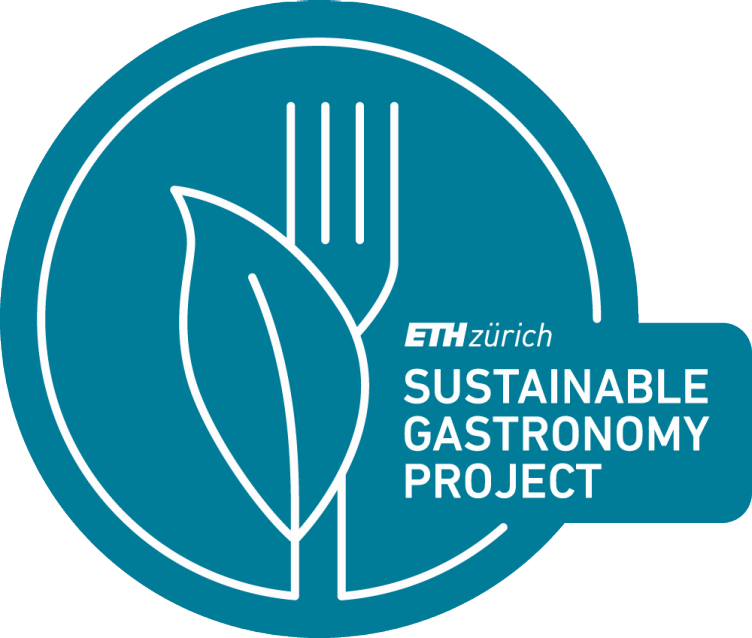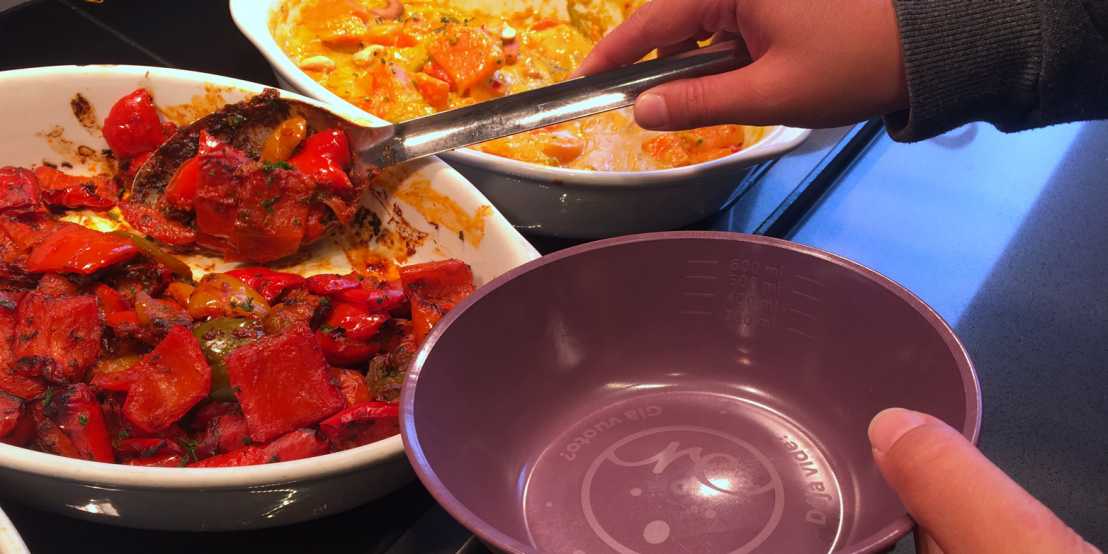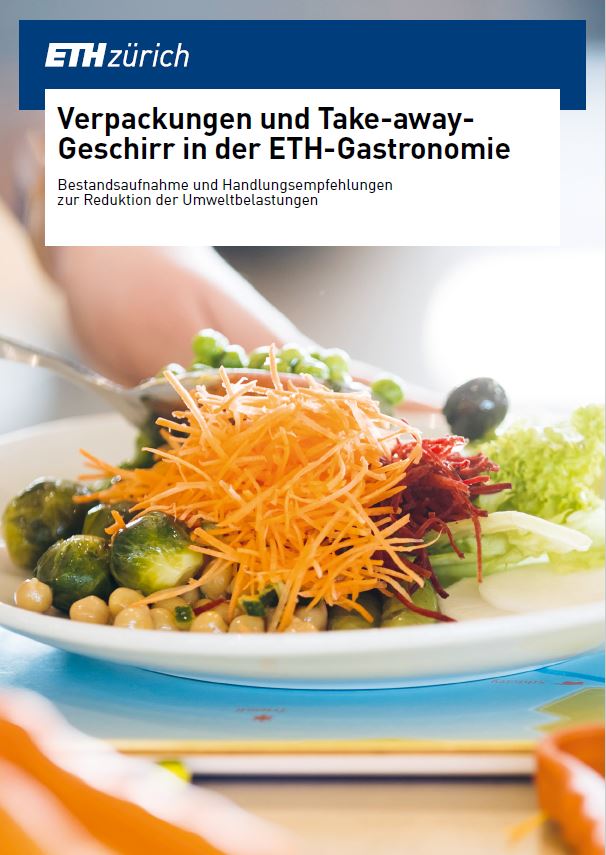Sustainable Gastronomy Project
The joint project with the catering companies aims to make the restaurants on the ETH Zurich campus more sustainable. The demand of the guests is crucial for success.
News
Get a share of the harvest from ‘meh als gmües’ at the Hönggerberg campus depot!

From October, the ‘meh als gmües’ vegetable cooperative will have a depot at ETH on the 1st basement level in the HIB on the Hönggerberg campus. Isabelle Castagna spoke in advance with Orlando Scholz, a member of the operations group, about the offer and the benefits for the ETH community.
The “Sustainable Gastronomy Project” at ETH Zurich runs since January 2022

The “Sustainable Gastronomy Project” replaced in 2022 the previous “Gastronomy Climate Programme”. Based on scientific findings, the project aims to make ETH restaurants more sustainable in the long term.
It runs for three years (2022–2024) and comprise four sustainability categories: Climate Protection, Resource Conservation, Social & Ethical Issues, and Health. A total of 17 criteria with specific Download targets (PDF, 108 KB) have been defined.
The guests have a choice
For the project to succeed, it must be matched to demand appropriately. With their daily selection from the menu, the guests of the ETH restaurants have a significant influence on the CO2eq footprint and other sustainability aspects of the food served.
The guests have a choice: If they choose vegetarian or vegan dishes more often, only help themselves to as much food as they actually want to eat, or regularly choose reusable instead of disposable dishes for takeaway, they can contribute to the success of the project and thus add significantly to the ETH restaurants’ sustainability.
...with the restaurants Clausiusbar, Dozentenfoyer, food&lab, Mensa Polyterrasse, Octavo, food market, Foodtrailer ETZ, Alumni quattro Lounge, CafeBar, Einstein & Zweistein, Tannenbar, Zwei Grad Bistro, Bistro HPI, the SV Group has already achieved the following:
Climate protection
- On average across all restaurants, greenhouse gas emissions per main meal were already reduced by 8% in 2022 compared to 2019. This reduction is mainly due to the expanded vegetarian and vegan menu offers in the ETH Polyterrasse, in the food market, and in the Clausiusbar. For example, a purely vegan menu line was introduced at ETH Polyterrasse in February 2022. In addition, the demand for vegetarian and vegan aperos has increased.
- Goods imported via airplane amount to less than 0.1% of the entire shopping basket.
The project also focuses on sustainable procurement. Here, too, successes have been recorded:
Biodiversity
- 100% certified soy, or soy from non-critical regions.
- 10.2% of the goods originates from organic production.
- 100% of fish and seafood comply with WWF Switzerland recommendations (score 1 to 3). Of these, 80% of the fish are from recommended sources (score 1 or 2).
Social & Ethics
- 67% of red meat and 76% of poultry come from Swiss production as well as from particularly animal-friendly husbandry (BTS and/or RAUS).
- 100% of the eggs and egg products come from Swiss free-range farming.
- 73% of whole milk is from animal-friendly husbandry (IP-SUISSE). In addition to this, about 20 % of the other dairy products are IP-SUISSE certified.
- The following products of overseas origin are 100% Max Havelaar Fairtrade certified: coffee, sugar, and bananas. Other products such as SV IceTea, fruit juices, or baked goods with chocolate are also Max Havelaar certified.
Efficient use of resources
- Avoidable food losses are <32g per plate.
- ReCIRCLE reusable take-away boxes are available in all restaurants serving lunch. In the Clausiusbar and in the Mensa Polyterrasse, take-away menus are already only available in reusable boxes.
Further information on the achieved goals and sustainability activities is available external page here.
...with the FUSION restaurant at ETH Hönggerberg, the Compass Group has already achieved the following:
Climate protection
- Greenhouse gas emissions per serving have already been significantly reduced: In 2022, emissions are around 5.5% lower per portion than they were in 2019. The reduction of menus containing meat, especially of those containing red meat, played a major role in this success.
- So that guests no longer have to choose between counters serving vegetarian and meat-containing meals, a meat or a plant-based option is now available at the same serving point.
Biodiversity
- 100% fish and seafood from sustainable production with green rating according to the WWF fish guide.
- All palm oil and soy products contain 100% certified soy or palm oil sourced from non-critical regions.
Social & Ethics
- 100% Fairtrade coffee, sugar, bananas, and rice.
- 100% free-range eggs and egg-based products.
Health
- 93% use of fats from unsaturated fat sources.
- Every day at least 1 veggie menu with the protein amount recommended by the SGE.
- Promotion of fruits in menu and buffet planning.
Efficient use of resources
- Avoidable food losses are <24g per plate.
- ReCIRCLE reusable take-away dishes are available in all restaurants serving lunch.
In addition: Together with the Danish company external page Too Good to Go, Compass has been fighting food waste since October 2022. Throwing food away is no longer an option these days. With "Too Good to Go", everyone can make an active contribution. On the app, users can see which businesses in their area have leftover food, reserve it at a reduced price, and retrieve it in form of a surprise package. In this way, valuable food can still be sold - with benefits for everyone: the business, the guests, and the environment.
Further information on the goals achieved and the sustainability activities are available external page here.
The Sustainable Gastronomy Project aims to support the long-term development towards sustainable gastronomy at ETH Zurich. It is based on scientific findings and takes into account ecological, ethical and health aspects. The new project relies on a broader understanding of sustainability. In addition to the reduction of greenhouse gas emissions, it also includes other aspects from the environmental, social and health domains (e.g., regionality, fair trade, wholegrain products, etc.).
The aim of the project is to make university catering more sustainable. But it equally aims to create transparency about the process and its criteria, thereby informing the guests of the restaurants on the ETH campus and encouraging them to participate.
The project will run for three years (2022–2024) and will address four sustainability categories: Climate Protection, Resource Conservation, Social & Ethical Issues, and Health. A total of 17 criteria with concrete goals have been defined.
The Sustainable Gastronomy Project is a follow-up to the ETH Gastronomy Climate Programme, which has achieved remarkable success since 2018. It was developed between 2019 and 2021 by ETH Sustainability (Office of the President) in collaboration with the external page ETH Spin-Off Eaternity and with the close involvement of the catering companies SV Group and Compass Group. In addition, the project was accompanied by a steering group with the participation of two ETH professorships and the Partner Organisations section.
Participating restaurants and cafeterias of SV Group
ETH Zentrum:
CafeBar, Clausiusbar, Dozentenfoyer, Einstein & Zweistein, food&lab, Foodtrailer ETZ,
G-ESSbar, Mensa Polyterrasse, Octavo, Polysnack, Tannenbar, Zwei Grad Bistro
ETH Hönggerberg: Alumni quattro Lounge, Bistro HPI, food market
Participating restaurants and cafeterias of Compass Group:
ETH Hönggerberg: FUSION meal
For the catering companies, the project represents a challenge. Each criteria requires further checks as to whether the information about origin or production can be traced at all and whether it can be stored within the company’s own data system. The recipes and menu planning have to be adapted and additional certifications, e.g., on animal welfare or fair trade, have to be achieved without accruing significant additional costs.
The topics targeted in the project are not new to the catering companies. SV and Compass have both been working on several of these issues for a long time and can already point to significant progress.
Download Overview Project Sustainable Gastronomy (PDF, 313 KB) (German only)
Article in the Download "life"-magazine (PDF, 522 KB) of ETH Zurich (German only)

Reusable take-away boxes at ETH Zurich

Since the fall semester 2020/2021, menus in all dining halls and restaurants at ETH Zurich can be purchased in reusable boxes from CIRCLE. This is the sustainable alternative to disposable tableware on campus.
Currently excluded are the Bellavista restaurant and the RiceUp! on the Hönggerberg. At RiceUp! food can be filled into a reBox, but no reBox can be purchased or returned.
At the food trucks on the Hönggerberg, the reBoxes were actively offered. Due to lack of demand, the offer was discontinued again.
How does reCIRCLE work?
The principle of the reCIRCLE system is simple: You buy an eggplant-colored reCIRCLE box for a deposit of CHF 10 in an ETH restaurant or another restaurant of the reCIRCLE network, no matter where in Switzerland.
The so-called reBOX is either returned to a takeaway partner of the reCIRCLE network directly after use in exchange for the deposit or it is kept until the next restaurant visit. Before the boxes are put back into circulation, they are industrially washed by the respective restaurant.
In a first step, disposable boxes will continue to be offered parallel to the reBoxes (reusable). In the long term, the goal is that the disposable boxes are no longer needed.
About reCIRCLE
The Bern-based company reCIRCLE has introduced the first Swiss-wide reusable system for takeaway packaging. To counter the throwaway culture at lunch, reCIRCLE has been offering reusable boxes and cups since August 2016.
For this commitment, reCIRCLE won the Swiss Environmental Award in 2017 and the SEF Award in the production/commercial category in 2020.
A sustainable alternative to disposable containers
The solution of reCIRCLE makes it possible to behave ecologically without much effort. The reBOX can be reused at least a hundred times. As various studies show, the life cycle assessment is already better after a few cycles of use than with disposable tableware. The ETH has compiled various studies on this in a packaging analysis.

This packaging study provides information on the packaging and take-away tableware in ETH restaurants. It serves ETH catering partners as a decision-making basis for the sustainable adaptation of their food and beverage packaging visible to the guest.
Download Read the study (PDF, 4 MB) (only available in German)
More information about the history of the project can be found in the archive
Events
More links
Sustainability at ETH
Student Sustainability Commission (SSC)